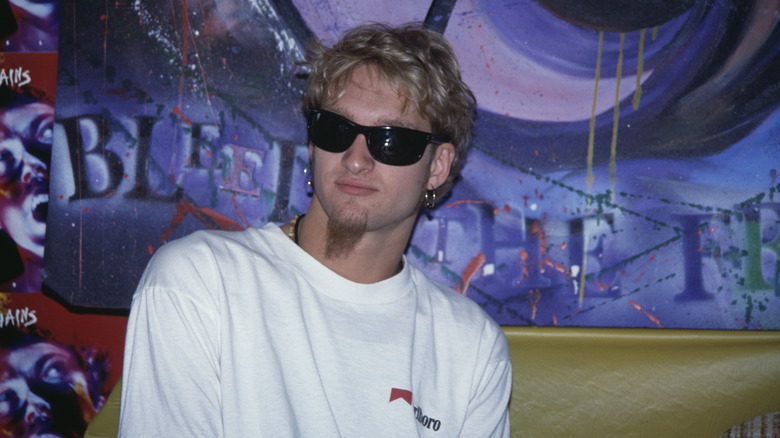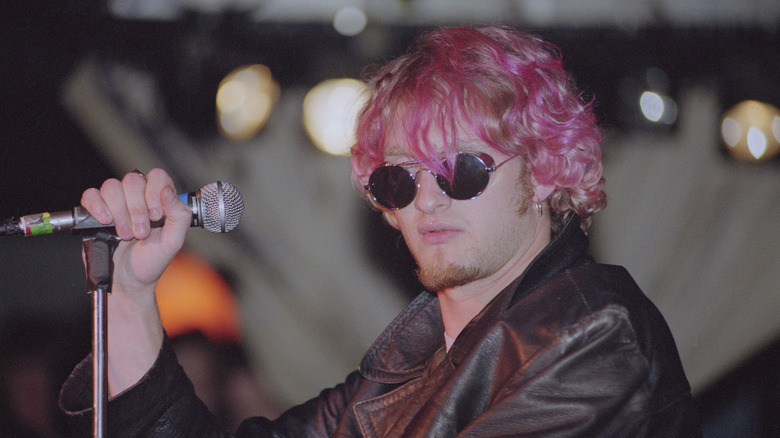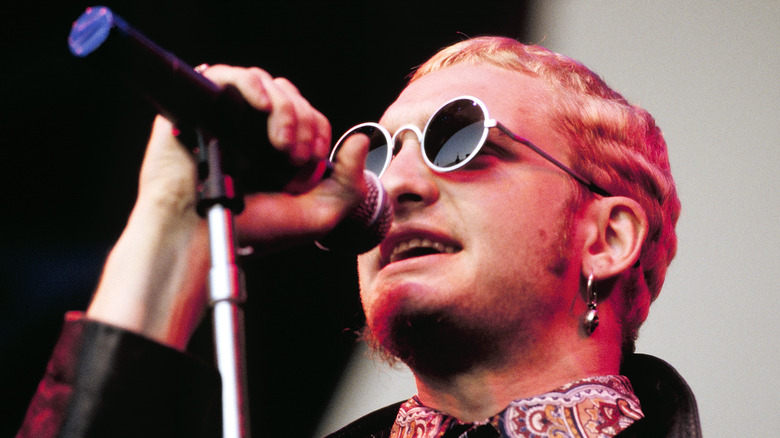The Tragic Real-Life Story Of Layne Staley
Alice In Chains frontman Layne Staley had one of the mightiest voices in rock history and — alongside Pearl Jam's Eddie Vedder and Nirvana's Kurt Cobain, among others — was one of the greatest figures to come out of the grunge movement that originated in his native Seattle, Washington. But you don't write and sing songs like "Rooster" and "Would?" and "Them Bones" unless you've got deep wells of pain to draw from for inspiration.
So it shouldn't surprise anyone — least of fall fans of his timeless music, the millions of people who cite him as an inspiration, or anyone familiar with rock star biographies — that despite his success, he lived a hard life and died too young. From rough beginnings to the deadly experiences with hard drugs that stole his prime and took his life to his final years as a recluse, these are the tragic details of one of rock history's greatest voices.
He came from a broken home
Like lots of rock stars, Layne Staley didn't have the happiest, most stable upbringing. His biological father, Philip Staley, vanished shortly after his birth in 1967, according to "Layne Staley: Angry Chair" by Adriana Rubio (and explained in Metal Sucks). At one point, Staley was even informed that his old man had passed away, although this wasn't true. "I got [a] call saying that my dad had died, [but] my family always knew he was around doing all kind of drug," he's quoted as saying in the book. "Since that call I always was wondering, 'Where is my dad?' I felt so sad for him, and I missed him. He dropped out of my life for 15 years." Not exactly a good start to the relationship. Staley goes on to discuss how he got back in touch with his dad years after giving up trying — but only because Phil had seen his photo in a magazine and, realizing he was rich, hit him up for drug money.
Staley spent the bulk of his childhood being raised by his mom, Nancy McCallum, and her second husband, Jim Elmer, who she met at a mutual friend's Christmas party, according to David de Sola. Fortunately for Staley, Elmer appeared to be a pretty decent stepdad and even played a large role in getting young Staley into music. Staley's first-ever concert, according to the article, was seeing Elton John in October 1975, who he checked out with Jim.
He hated his given middle name
Layne Thomas Staley wasn't born Layne Thomas Staley. "In 5th grade, he [Staley] borrowed his Uncle Bob's trumpet, so that was his first instrument," said Nancy McCallum, Staley's mother, according to Northwest Music Scene. "Then, our family friend Fred loaned him a drum set, and he loved the drums. He wasn't really into the trumpet, but the drums he loved. And then, our neighbor sold him a drum set, and he changed his middle name to Thomas, because he admired Tommy Lee."
Yes, Staley, born Layne Rutherford Staley on August 22, 1967, picked the middle name "Thomas" because he was a fan of Mötley Crüe drummer Tommy Lee. It seems strange, since Staley would, of course, go on to become one of the most noteworthy figures in a genre that would present itself as the antithesis of everything bands like Mötley Crüe stood for. But everyone starts somewhere.
But his love of Tommy Lee wasn't the only reason he swapped out his middle name. He seriously, seriously hated "Rutherford." David de Sola writes that Staley would fly into a minor rage whenever someone referred to him by that name. "It would make him madder than f***," said Nick Pollock, one of Staley's former bandmates, who claimed he used to call his buddy variations of "Rutherford" just to mess with him. "He would get so angry at me, he would be ready to get out of the goddamn moving car."
Layne Staley was raised Christian Scientist, but came to distrust religion
"I think people would be surprised that he [Staley] was raised in the Christian Science Sunday School for twenty years," his mother, Nancy McCallum, said to Alternative Nation in 2015. "They asked if he believed in God? And I thought, oh, for heaven sake, listen to his music. Of course he did." However, she goes on to say that her late son was "shocked to find that God isn't going to dig you out of every tunnel that you put yourself in to."
It's hard to tell if Staley would agree or disagree with his mom's take. "I believe that there's a wonderful place to go to after this life, and I don't believe in eternal damnation for anyone," he said to Rolling Stone in 1996. "I'm not into religion, but I have a good grasp on my spirituality. I just believe that I'm not the greatest power on this earth. I didn't create myself because I would have done a hell of a better job."
You're not wrong if you're picking up on a bit of resentment at the end there. According to this Alice In Chains interview with Rockline on July 19, 1999, Staley wrote the song "Get Born Again" to target what he saw as "religious hypocrisy." Clearly, Staley maintained some of what he learned in his religious upbringing, but he wanted nothing to do with the structures it forced him into.
He was private about his heroin addiction
"When he returned from a trip to the bathroom," wrote Jon Wiederhorn about Layne Staley for Rolling Stone, "his sleeves were unbuttoned, exposing what appear to be red, round puncture marks from the wrist to the knuckles of the left hand. And as anyone who knows anything about IV drugs can tell you, the veins in the hand are used only after all the other veins have been tapped out."
Yes, Staley had been experiencing heroin addiction for years by the time this 1995 article — which was titled "Alice In Chains' Layne Staley: Needle and Damage Done" — came out. Still, obvious as it was, Staley got defensive when pressed about his habit, worried it would come to define him. "When I haven't talked to anybody in years, and every article I see is dope this, junkie that, whiskey this — that ain't my title ... My bad habits aren't my title. My strengths and my talent are my title," he said.
However, that defensiveness had nothing to do with personal embarrassment. He insisted he wanted to play down his addiction because he was worried that wearing it on his sleeve would turn fans on to drugs, which had gone from a fun hobby to a life-threatening burden. "When I tried drugs, they were f****** great, and they worked for me for years," he said. "And now they're turning against me, and now I'm walking through hell, and this sucks. I didn't want my fans to think that heroin was cool."
If you or anyone you know is struggling with addiction issues, help is available. Visit the Substance Abuse and Mental Health Services Administration website or contact SAMHSA's National Helpline at 1-800-662-HELP (4357).
His estranged father turned him back on to drugs
Far Out Magazine details one of Layne Staley's final interviews, as published in "Layne Staley: Angry Chair." Much of the interview deals with his ongoing experiences with heroin addiction, which he claims were about to take his life. But he did take time to discuss his relationship with his biological father, saying he went off on a journey at age 16 to find his estranged dad, only to find out just enough regarding his father's lifestyle to give up the effort. In the end, his dad found him.
"I was about 20," he said, "and music became my only obsession to stay alive. I had the chance to throw out all this anger by the music in order to help others. It was therapeutic and worked for me for a while, until my dad saw my picture printed on a magazine." Then, Staley said his dad reached out. But rather than a heartwarming reunion between father and son, his dad's habits rubbed off on him when he was trying to stay clean. "I was trying to kick this habit out of my life, and here comes this man asking for money to buy some smack." Eventually, his father managed to stop using. But Staley, of course, never did. "He finally kicked heroin use, and I'm still fighting," the singer said.
If you or anyone you know is struggling with addiction issues, help is available. Visit the Substance Abuse and Mental Health Services Administration website or contact SAMHSA's National Helpline at 1-800-662-HELP (4357).
Layne Staley became a recluse in his final years
According to a transcript of a 2002 Rolling Stone article, Layne Staley spent the final years of his life in reclusive isolation, with nothing but his drugs to keep him company. The story of his decline began on July 3, 1996, after Staley left the stage following a warm-up set for KISS. He would never perform with Alice In Chains again.
According to "sources close to the band," Staley lost his 27-year-old ex-girlfriend, Demri Parrott, to a heroin overdose later that same year. His will to live went with her. Staley sightings became increasingly rare, and rumors circulated that the singer was wasting away in his Seattle apartment, doing nothing but drugs, painting, and playing video games to pass the time. Other (false) rumors emerged, claiming that Staley had contracted gangrene by shooting up and had body parts ranging from fingers to an entire arm amputated.
Whether or not he still spoke to his bandmates was also up for debate. The article notes that Jerry Cantrell had told Kerrang! in 1998 that he and the other guys in Alice frequently hung out with Staley at his place, playing video games and having a grand old time. A year later, though, drummer Sean Kinney painted a different story, saying, "I talk to Layne, but we don't hang out. I don't live his lifestyle, so his house isn't the healthiest place to be around. I don't need any help to get annihilated."
If you or anyone you know is struggling with addiction issues, help is available. Visit the Substance Abuse and Mental Health Services Administration website or contact SAMHSA's National Helpline at 1-800-662-HELP (4357).
He hallucinated the ghost of his ex-girlfriend
The 2002 Rolling Stone article claimed that the death of ex-girlfriend Demri Parrott was one of the catalysts for Layne Staley's collapse into an isolated, drug-fueled existence that ultimately claimed his life. "Alice In Chains: The Untold Story" says the two met in 1988, before Alice in Chains blew up, and that it was "love at first sight." They were attached at the hip until 1994 when they split for a final time. Parrott, too, was a heavy drug user and fatally overdosed on October 29, 1996. Although they were no longer together, Staley was clearly devastated by the news.
The book says that former Alice bassist Mike Starr was visiting Staley the day before the singer's death. The two were allegedly watching a show called "Crossing Over," which is about a psychic medium that helps connect loved ones to deceased relatives. "Demri was here last night," Staley allegedly said. "I don't give a f*** if you f****** believe me or not, dude. I'm telling you: Demri was here." Starr left Staley's place later that day. No one would ever see him alive again.
For what it's worth, Demri's mother believes Staley, although he was clearly affected by his drug use. She claims her daughter had come "to be there with Layne as he's doing his transition." Whether you believe it or not, it's a hauntingly beautiful story. And it's a little comforting to think Staley at least didn't believe he was alone at the end.
He knew death was near
According to MTV, the book "Layne Staley: Angry Chair" details the AIC singer's final interview with author Adriana Rubio, an Argentinian journalist. "I know I'm dying," Staley is reported to have said. The book notes he was missing teeth and struggling to breathe. "I'm not doing well," the singer said. "Don' try to talk about this to my sister Liz. She will know it sooner or later."
He then goes says his heroin habit was to blame, and he was well past the point of shooting up for fun. "This f****** drug use is like the insulin a diabetic needs to survive. I'm not using drugs to get high like many people think. I know I made a big mistake when I started using this sh** ... The pain is more than you can handle. It's the worst pain in the world. Dope sick hurts the entire body."
At this point, Staley was too weak to fight on and admitted to having accepted that the drug would get the better of him sooner or later. "I never wanted to end my life this way," he continued, lamenting but ultimately accepting his decision to start using crack cocaine and heroin years before. "I know I have no chance. It's too late. Don't try to contact any AIC members. They are not my friends."
If you or anyone you know is struggling with addiction issues, help is available. Visit the Substance Abuse and Mental Health Services Administration website or contact SAMHSA's National Helpline at 1-800-662-HELP (4357).
Layne Staley dies
On April 5, 2002, Layne Staley took a speedball — a combination of cocaine and heroin — and passed away (via Diffuser).
Even sadder, Seattle Weekly says Staley's death contributed to the reversal of an encouraging decline in drug overdoses in the Seattle area. It cites reports of 76 crack cocaine-related deaths in 2002, up sharply from 46 the year before, and 80 opioid deaths compared to a milder 64 in 2001. And as we're all aware, things have hardly improved in the decades since.
Although he'd lived as a recluse for years, former Alice in Chains bassist Michael Starr — who Diffuser says blamed himself for Staley's death — claimed on an episode of "Celebrity Rehab with Dr. Drew" that he was the last person to see Staley alive. The two had argued over Staley's condition until Staley threatened to end the friendship if Starr reached out to the authorities. As Starr stormed out, Staley begged him to stay, saying, "Not like this. Don't leave like this."
Sadly, Starr wasn't too far behind his former friend and bandmate. In 2011, at the age of 44, he too died of an overdose, as per Rolling Stone.
His body wasn't found for weeks
Seattle Weekly describes the tragic scene when police kicked in the door to Layne Staley's condo in Seattle's University District on April 19. They found the deceased singer sitting upright, surrounded by drugs and drug paraphernalia, cans of spray paint, spent needles, and unspent cash, all illuminated by a flickering TV. He'd been dead for weeks, still cradling a full syringe of heroin.
Staley had actually died on April 5, 2002 — eight years to the day after fellow Grunge rock frontman Kurt Cobain had taken his own life — but his body wasn't found until April 19, according to Ultimate Classic Rock. Because he'd been a recluse for so long, friends and family who might've found him earlier didn't think it was particularly odd they hadn't heard from him during that time. In fact, it was his accountants who first noticed something might've been up. Diffuser says that after they realized the singer hadn't spent money in a strange amount of time, Staley's mother gave the police permission to breach his door.
She wasn't far behind, having immediately clocked out of work and raced home, flying past five police cars who, thankfully, didn't try to stop her. She then ignored directions from the officer on the scene to stay outside, entered the house, and sat next to her son's body. "I promised that I would always be there for my children," she said to The Seattle Times. "I told him I was sorry this was how it turned out."
His mother is still haunted by her son's death
It's hard enough to lose a child. But having the circumstances of their death constantly rubbed in your face because so many others are experiencing addiction must be difficult. Harder still, Nancy McCallum told The Seattle Times that she still gets flooded with emails and letters from people all over who are experiencing addiction or love someone who is. One way she's contributed to the fight is by helping run the Layne Staley Tribute Concert, which the article says is an annual celebration of Alice in Chains' contributions to music. Money goes to the Therapeutic Health Services (THS), which runs the Layne Staley Memorial Fund. That charity fights heroin dependency in the Seattle area.
But all too often, McCallum doesn't know what to say; she's just another grieving parent whose kid happened to be famous and touch lives. "I don't have any magic answers," she told the paper. "It's heartbreaking and overwhelming and unnecessary." She says she hopes that her son's music will shed light on the disease of addiction that ultimately took his life. "The opioid explosion in recent years tells me that people feel alone," she says. "This music ... Layne was writing a warning."
If you or anyone you know is struggling with addiction issues, help is available. Visit the Substance Abuse and Mental Health Services Administration website or contact SAMHSA's National Helpline at 1-800-662-HELP (4357).











